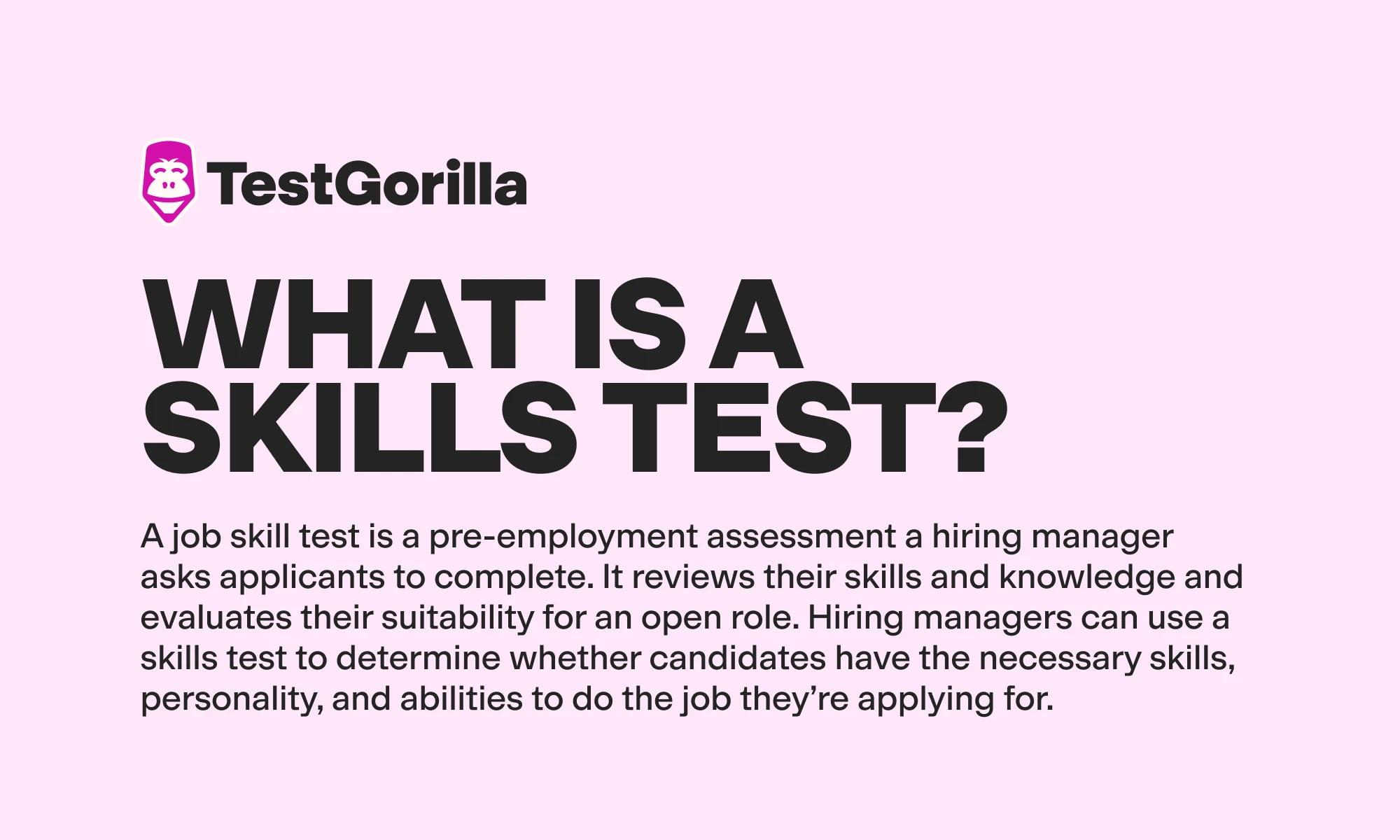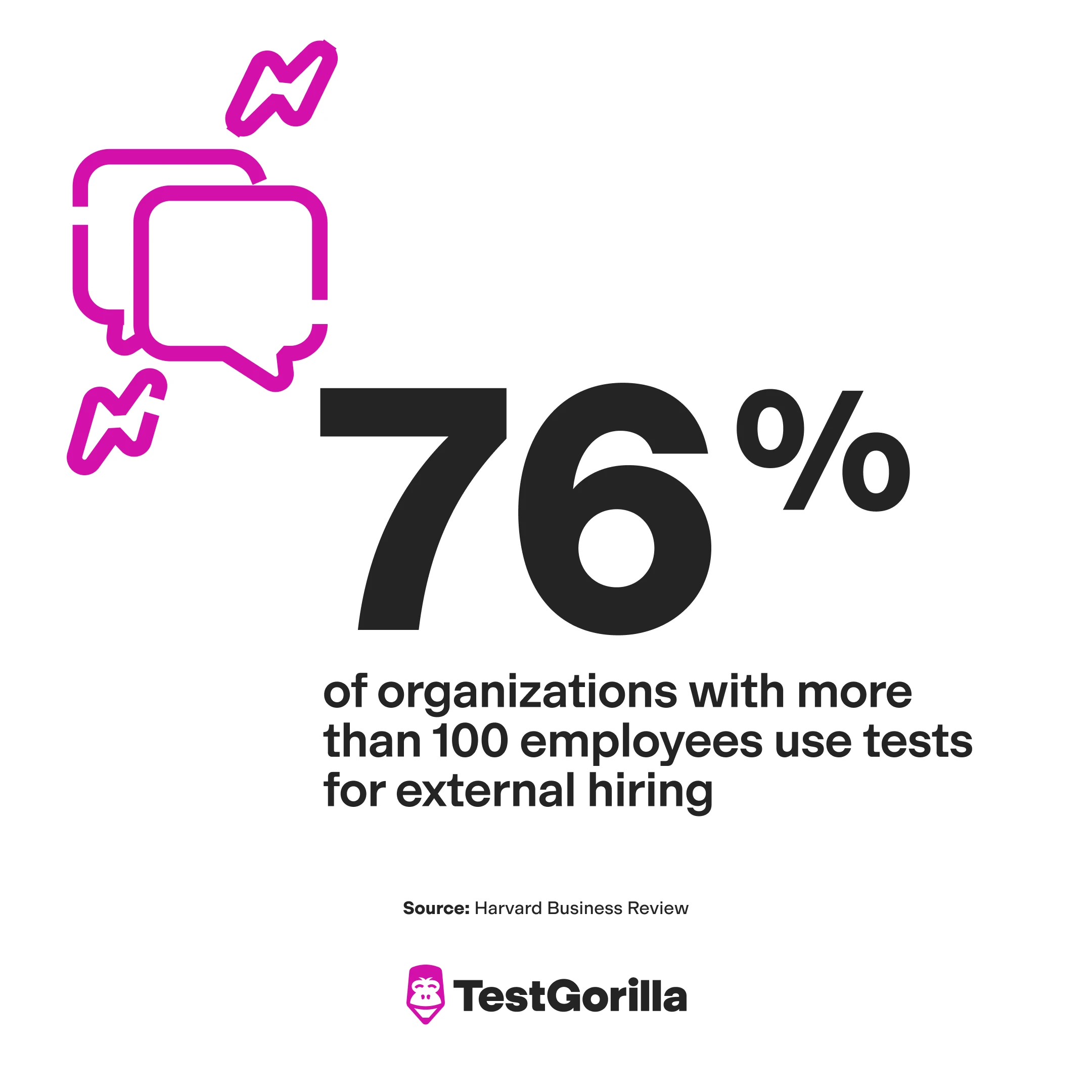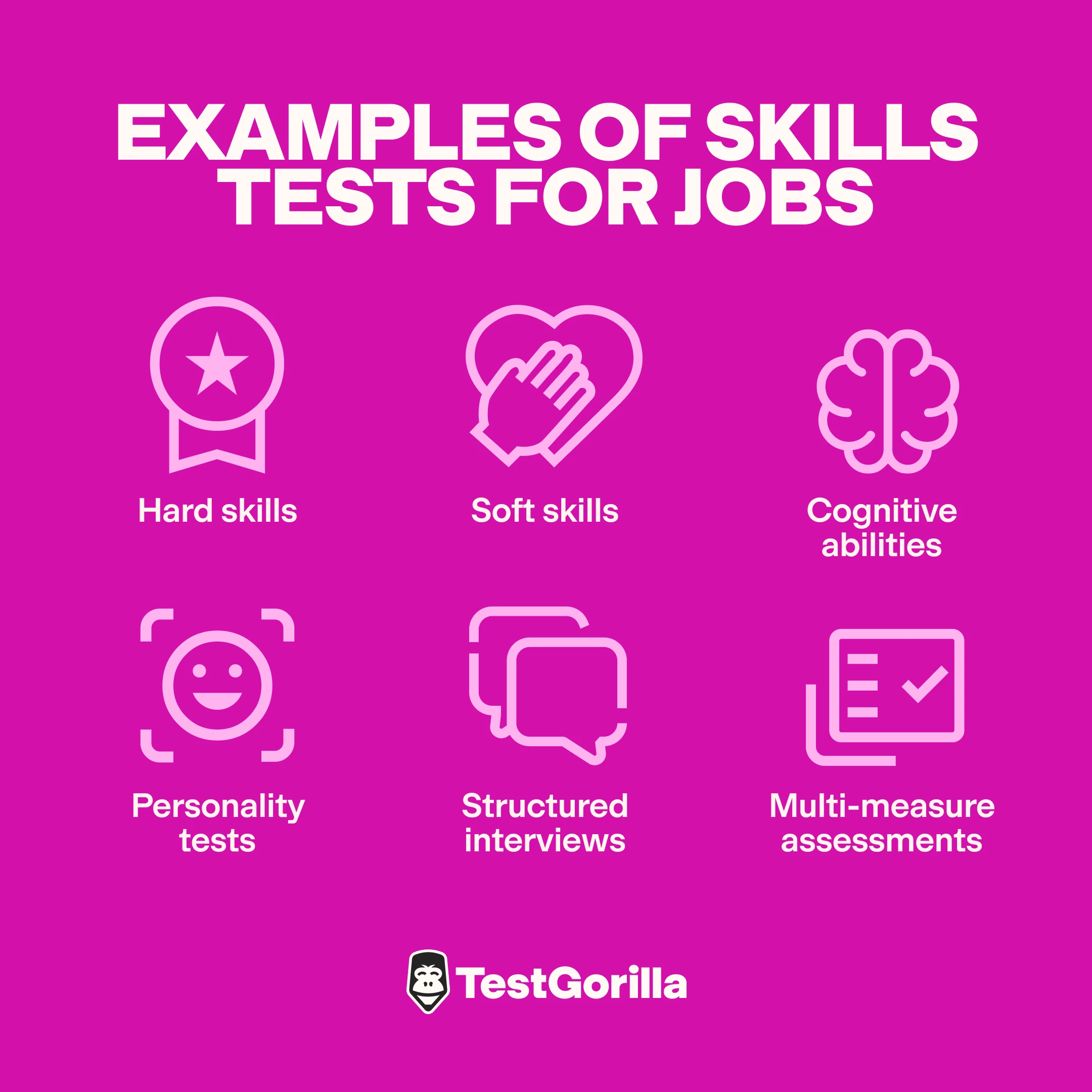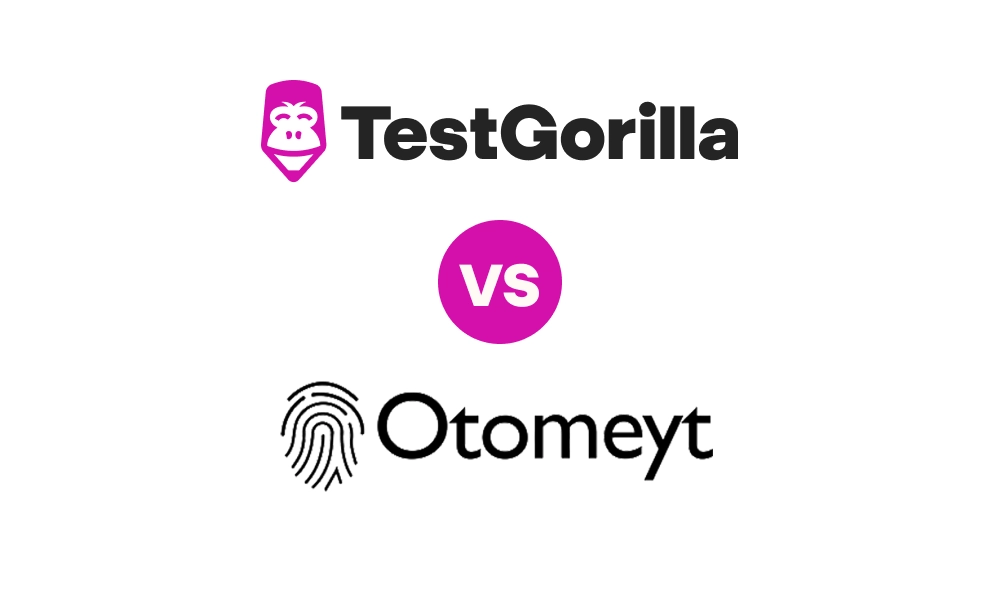How to skills test for jobs: Competitive advantages for recruiters
Efficiently skills test for jobs with our award-winning platform
Communication skills are one of the few skills you can directly observe during the traditional hiring process in the interview.
Even then, you may not get the full picture of how a candidate communicates in a team or with those they’re managing. Besides, the interview stage comes after the initial screening, so you may discard people whose communication skills you know little about.
You need a way to evaluate candidates’ skills directly before the interview process starts. That’s where a skills test for jobs comes in.
In this article, we discuss how to use skills testing for employment and the types of job skill tests available.
Table of contents
What is a skills test?
A job skill test is a pre-employment assessment a hiring manager asks applicants to complete. It reviews their skills and knowledge and evaluates their suitability for an open role. Hiring managers can use a skills test to determine whether candidates have the necessary skills, personality, and abilities to do the job they’re applying for.
There are many types of skills tests for jobs, but they frequently take the form of online psychometric tests like the ones we deliver at TestGorilla.
Candidates answer a mix of written and multiple-choice questions – here’s an example from our Basic Math Calculation test:
Speak to an expert and learn how skills tests can help you
Spend just 30 minutes speaking to a member of our team, and you’ll receive a customized preview of how TestGorilla can revolutionize your hiring process.
Benefits of skills testing for jobs
There are many benefits that skills testing for jobs offers over traditional methods like resume evaluation.
With resume screening and certifications, the hiring manager can only see those skills a candidate claims to have. The only genuine ability that can be reviewed is resume writing skills – and perhaps creativity, too, if they’ve embellished their resume.
This drawback leads to many false positives (candidates with great resumes who don’t have the skills to excel) and many false negatives (job applicants without good resume writing skills but who have the skills necessary for the role).
Here are some of the benefits that using a skills test for job interview screening offers by comparison.
Benefits of skills tests | Summary |
Create a bias-free hiring process | Using work skills tests for jobs reduces bias because each candidate gets the same test and the same amount of time to complete it. In addition, test results are numerical, so the hiring manager can compare candidates easily and objectively. |
Scalable solution | When your company uses a skill test for employment screening, it does not matter if you receive 20 or 220 applications; the process remains the same. |
Great candidate experience | Candidates want feedback from companies, even when they don’t get a job. When you incorporate skill tests into your hiring, you can allow candidates to see their scores. There is no ambiguity in the process, and candidates can identify where they need to improve. |
Easy to use | Pre-employment tests are straightforward. Some companies take it further and insert a skills assessment test into their application systems to immediately filter out unqualified candidates. |
Remove reliance on resume screening | Instead of sifting through hundreds of resumes and trying to find a needle in a haystack, you can simply send your candidates the aptitude tests and wait for the results. You can find all of the needles in the haystack, no matter how big that haystack is. |
Examples of skills tests for jobs
Talent assessments are already widely used in hiring. According to the Harvard Business Review, 76% of organizations that employ more than 100 people use job skills tests for hiring.
1. Hard skills
Hard skills are typically defined as role-specific technical skills that are required to complete the core tasks of a job. For example, the hard skills necessary for a data engineer include:
Data warehousing
Coding – for instance, Python and SQL
Knowledge of database systems
Data analytics
Talent assessment tests have been used to assess hard skills in STEM fields for years, but online psychometric testing has enabled employers to test hard skills across other professions, including marketing, HR, and sales.
Hard skills in these fields include skills like:
Using human resource information systems
Understanding of labor laws
Google Ads
Email marketing
Using customer relationship management systems
2. Soft skills
Soft skills are often defined as personal attributes or personality traits that govern how individuals work with others and motivate themselves when working alone.
Unlike hard skills, soft skills are hard to teach, although some may be more important in certain roles. They’re also harder to replace with AI.
For example, communication skills are useful in almost every job, but they are more important for managers who work with large teams than for, say, IT workers who work mostly in isolation.
Soft skills include attributes like:
Openness to feedback
Time management
Leadership
Being a self-starter
Although they aren’t as easily or widely taught as hard skills, you can develop new skills through training such as mentoring and workshops.
A soft skills test for jobs usually involves situational judgment questions, which describe a situation and ask candidates to consider how they would respond.
3. Cognitive abilities
Cognitive abilities refer to how people process information and can inform how they communicate with others, solve problems, generate ideas, and make decisions in the work environment.
There are four main types of cognitive abilities:
Attention
Memory
Logic and reasoning
Auditory and visual processing
Using at least one cognitive skill test for employment is important because these assessment tools can reveal important aspects like a candidate’s ability to learn on the job and “raw” intelligence that can’t be reflected on a resume.
If you’re looking for a cognitive skill test for jobs, consider using spatial reasoning tests, verbal reasoning tests, and numerical reasoning tests.
4. Personality tests
When used with skills tests for recruitment, personality tests can give you a comprehensive view of whether a candidate would be a good addition to your team or culture.
The most famous examples of personality tests are the 16 types test, enneagram, and the Big 5 (OCEAN) personality test.
For example, if your organization prides itself on innovation and creativity, a candidate who scores highly for openness on the Big 5 personality test is likely to bring new ideas to the table and roll with the punches of a dynamic workplace.
If they have the necessary hard and soft skill set to back it up, they could be a great hire.
5. Job simulations
One of the best ways to give candidates a job skills test is with a job simulation in which you simulate a real task the candidate would have to complete if hired.
A common example of this type of test for job skills is a coding task, in which you give a candidate for a programming role a problem to test:
Algorithmic thinking, such as searching, sorting, and recursion
Language-specific concepts, for example, data structures and object-oriented programming
Debugging
To browse through more examples of debugging tests for coders, click here.
Another example of a job simulation would be asking a customer service candidate to write an email in response to an example complaint from an angry customer.
6. Structured interviews
Traditional hiring methods favor unstructured interviews, in which hiring managers ask whichever questions occur to them, in any order, with the interview unfolding like a conversation.
This method has been proven to allow more unconscious bias. It often means that different candidates are asked about different, specific skills, which makes it hard to compare them fairly and encourages cultural fit.
By contrast, in structured interviews, interviewers ask candidates:
The same questions
In the same order
With the same evaluation criteria applied to each answer
It speeds up the decision-making process and levels the playing field for candidates by reducing the effects of interviewer bias.
7. Multi-measure assessments
Of course, one type of skill test for jobs isn’t enough to find the right candidate.
The best way to identify quality candidates is with multi-measure assessments, which use a combination of the job skill tests mentioned above to create a holistic picture of the candidate’s proposition.
Here’s an example of what that might look like for a sales development representative:
Skills test for jobs | What it measures |
B2B Outside Sales test | Hard skills |
B2B Sales Lead Generation test | Hard skills |
Negotiation test | Soft skills |
Numerical reasoning test | Cognitive abilities |
Big 5 (OCEAN) test | Personality |
Combine this with a structured interview that includes a simulated cold call, and you have a thorough evaluation.
Find candidates with the key skills you need.
Create comprehensive multi-measure assessments with TestGorilla.
Work skills tests vs. other assessment methods
It’s clear that replacing your resume evaluation process with a test for job skills increases hiring efficiency by creating an automatic shortlist based on objective data.
What other benefits does skills testing boast over traditional hiring?
| Resumes | Unstructured interviews | Skill test for jobs |
Accuracy | Research shows prehire work experience is a poor predictor of job performance and retention. | - Questions aren’t decided beforehand based on the core skills required. - Different candidates may be asked about different skills – or not asked about core skills at all. | Skills tests are the most accurate because they shortlist candidates based on objective performance data, with all candidates completing the same assessment. |
Unconscious bias | - There’s no standard format for resumes, meaning that hiring managers could inadvertently favor resumes that fit their favored format. - Studies show that applicants with White-sounding names are 9% more likely than those with Black-sounding names to receive responses; resume screening lets this bias run riot. | - Candidates’ performance is harder to compare because they each answered different questions, leaving hiring managers to rely on individual impressions. - Interviewers may unconsciously favor certain candidates and ask them easier questions. | Job skills tests screen candidates based on talent: One study found that the number of women hired into senior roles increased by nearly 70% after switching to skills-based hiring. |
Potential for candidates to lie | Candidates can easily lie on their resumes to satisfy the job description and not be caught out until the interview or even hiring – wasting time and money. | - Candidates can lie or embellish the truth in job interviews. - Hiring managers may not always be equipped to catch these lies, especially when hiring for roles they’re unfamiliar with. | - Extensive anti-cheating measures are in place to prevent falsification. - Tests candidates’ skills directly instead of relying on an honor system. |
Skills test for jobs with TestGorilla and hire the best
We’ve seen that using skills-based hiring methods is:
Quicker
More effective
Less prone to bias
Let’s look at an example of using a TestGorilla skills test for jobs when hiring a marketing manager.
The best talent assessments include five skills tests for jobs, measuring multiple variables across the categories outlined above. For this role, you could include:
Branding Strategy test
GDPR & privacy test
Technical SEO
Big 5 (OCEAN) personality test
Verbal reasoning test
The Verbal Reasoning test is important because verbal reasoning is a cognitive ability that underpins many important marketing tasks, such as copywriting.
Switching to this data-driven approach ensures you invite only quality job candidates to interview every time.
Contentoo, one of our content marketing clients, experienced this firsthand and is a perfect case study. It chose TestGorilla to remove bias from the hiring process and improve the quality of its current employees. First, the team took the skills test to create a benchmark, then rolled out the work skills test to candidates.
The result was that even hiring managers with minimal experience in the role could make confident, data-driven hiring decisions, and successful candidates could expect career development opportunities.
Make data-driven hiring decisions.
Use TestGorilla’s objective skills tests to supercharge your hiring process and spot the best candidates on the job market.
Use TestGorilla to skills test for jobs the right way
In this article, we’ve explored questions like:
What is a skills test?
What are the benefits of using skills testing for employment?
What types of job skills tests are there?
How can you use a skills test for jobs?
To apply this learning to your recruitment process, get started with TestGorilla today by signing up for a product tour.
For a detailed walk-through of the platform and how it could revolutionize your hiring process, sign up for a TestGorilla demo.
Or, if you want to dive in straight away, register for our Free forever plan.
Skills test for jobs FAQs
Unsure of how or why to use a skill test for jobs? Here are some work skills test FAQs.
Why do employers use skill tests?
Employers use skill tests for jobs because they are quicker and more effective than resumes for screening applicants. By testing candidates’ competencies directly and objectively, employers reduce bias and increase the chances of making a qualified hire in every circumstance.
What type of questions are asked in a skill test?
In a skill test for jobs, potential new hires are usually asked multiple-choice questions. However, you might also be asked to complete short-answer questions, long-answer or essay questions, video questions, job simulation tasks, situational judgment tests, and match-the-list activities. You can prepare for these questions by learning about job roles.
What is a good score on a skills test for jobs?
A good score on a skills test for jobs is usually between 60% and 80%. However, employers may use industry or talent pool benchmarks that make this higher or lower. For example, if a test is particularly advanced and most candidates only get 50% of questions right, a score of 60% would be competitive.
Related posts
Hire the best candidates with TestGorilla
Create pre-employment assessments in minutes to screen candidates, save time, and hire the best talent.
Latest posts
The best advice in pre-employment testing, in your inbox.
No spam. Unsubscribe at any time.

Hire the best. No bias. No stress.
Our screening tests identify the best candidates and make your hiring decisions faster, easier, and bias-free.
Free resources
This checklist covers key features you should look for when choosing a skills testing platform
This resource will help you develop an onboarding checklist for new hires.
How to assess your candidates' attention to detail.
Learn how to get human resources certified through HRCI or SHRM.
Learn how you can improve the level of talent at your company.
Learn how CapitalT reduced hiring bias with online skills assessments.
Learn how to make the resume process more efficient and more effective.
Improve your hiring strategy with these 7 critical recruitment metrics.
Learn how Sukhi decreased time spent reviewing resumes by 83%!
Hire more efficiently with these hacks that 99% of recruiters aren't using.
Make a business case for diversity and inclusion initiatives with this data.


























